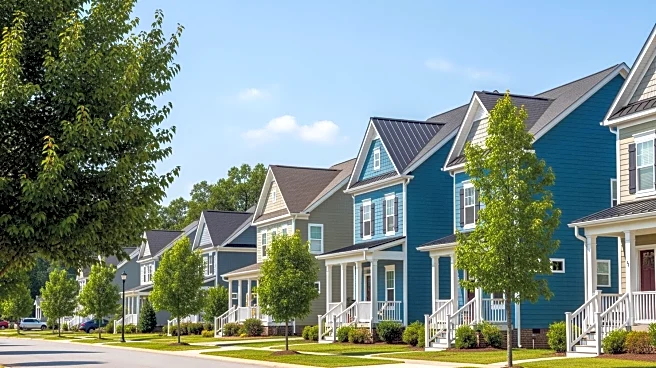What's Happening?
A recent analysis of cross-market demand data from Realtor.com reveals that homebuyers from various metropolitan areas are increasingly interested in purchasing homes in Burlington, North Carolina. The scarcity of homes on the market nationwide, which
remains below pre-pandemic levels, has kept prices elevated despite a slowdown in sales over the past year. This trend has led many Americans to rely heavily on online house hunting, with a 2021 National Association of Realtors report indicating that 97% of homebuyers used online websites for their home searches. The data highlights significant interest from cities such as Atlanta, New York, and Washington, D.C., with Atlanta leading the view share at 13.4%.
Why It's Important?
The growing interest in Burlington, North Carolina, from major metropolitan areas underscores a shift in housing preferences and market dynamics. As home prices remain high due to limited inventory, buyers are exploring options in less saturated markets like Burlington. This trend could lead to increased economic activity and development in Burlington, potentially driving up local property values and altering the community's demographic landscape. For residents and local businesses, this influx of new homeowners could mean more opportunities for growth and investment, while also posing challenges related to infrastructure and resource allocation.
What's Next?
As interest in Burlington continues to rise, local policymakers and real estate developers may need to address the potential impacts of increased demand. This could involve strategic planning to expand housing inventory, improve infrastructure, and ensure sustainable growth. Additionally, the local community might see changes in its cultural and economic fabric as new residents bring diverse perspectives and needs. Monitoring these developments will be crucial for stakeholders aiming to balance growth with community well-being.
Beyond the Headlines
The trend of homebuyers from larger metros moving to Burlington reflects broader shifts in lifestyle preferences, possibly driven by remote work opportunities and the search for more affordable living conditions. This movement could influence cultural dynamics, as new residents integrate into the community, bringing different values and expectations. Long-term, Burlington may experience changes in its identity and social structure, prompting discussions on inclusivity and community cohesion.















